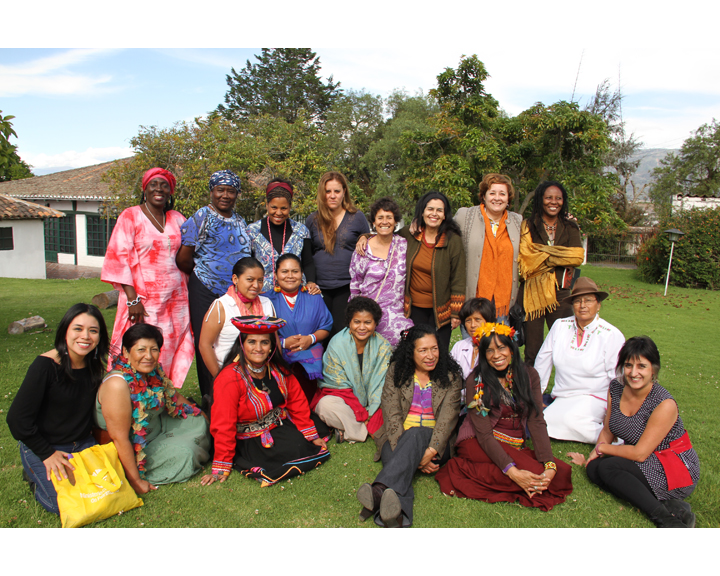

Bridging racial barriers with words

"Women musicians, women who create and write, dance and weave, cook and run their communities. Women who are teachers and who live poetry in their lives. Women who are all committed to change, to struggles, to solutions."
This is how Ecuadorian poet Jennie Carrasco Molina describes her companions at an extraordinary meeting of indigenous, black and mestizo Latin American women artists sponsored by the MDG Fund to give a voice to a group that has historically been invisible.
"The urban writers nourished themselves with the poetry of the countryside, the young women with the verses of their elders, the black writers with the flow of indigenous women, the native women with the force of the blacks. Everyone was enriched and strengthened to continue writing and singing," said Carrasco, of the
2nd International Congress of Indigenous, Mestizo and Afro-American Writers.
Twenty authors from Brazil, Colombia, Cuba, Ecuador, Mexico, Nicaragua, Peru and Venezuela gathered in Quito in mid-November to mark the publication of the anthology "A Necklace of Moons and Stories,” which includes the poetry of indigenous women of Latin America.
Mestizo, indigenous and black women have had a history of silence and segregation in Latin America – doubly so for women artists. In Ecuador, for example, indigenous and black authors are not represented in anthologies or in literary contests, nor are they members of writers’ associations.
Lara Barbarita, a writer from the Chota Valley of Ecuador, said it is time to give back a voice to women who are "undervalued, faceless, voiceless, with no arena nor recognition for their literary thought and creation.” The symposium, Barbarita said, transformed her.
The conference is part of the MDG-Fund’s work with the government of Ecuador to encourage inter-cultural dialogue and to reduce discrimination and social exclusion of minorities and disadvantaged groups, many of which live in poverty with limited access to education, health and economic opportunities. The MDG-Fund’s mission is help countries reach the Millennium Development Goals to reduce poverty and improve livelihoods, with a particular focus on the most marginalized and deprived communities.
Ecuador is ethnically diverse, with mestizos – descendants of Spanish colonists and indigenous people – constituting 65% of the population, and Amerindians, Afro-Ecuadorians and people of Spanish descent making up the rest. Afro-Ecuadorians suffer particularly from poverty and exclusion.
"The conference points us towards a new world, far from violence and discrimination,” said Carrasco, who spearheaded the compilation of a hundred poems in the anthology. “In the voices of the writers, there’s a force which leads you to other dimensions, to another consciousness, to the magic and freshness known to the ancient inhabitants of this continent."
The three-day symposium focused on issues of ethnicity, identity, differences and similarities, and points of intersection between groups. Participants discussed how the urban mestizo culture influences indigenous writing, proposals for public policies to encourage the spreading of oral traditions and the use of native languages in writing, and the influence of African deities on literature.
"It was an encounter full of dignity,” remarked Brazilian writer Eliane Potiguara, who said indigenous cultures have always been marginalized by Brazil’s cultural patrons and by the intolerance and discrimination perpetuated by her country’s dominant culture. “It restored our self-esteem as women… those of us who have suffered for so long and seen the tears of our grandmothers.”
Other participants said the conference gave them a rare opportunity to speak one language, without differentiating between blacks, Indians and mestizos.
"Poetry is like a shout, an overwhelming force, a new skin. It's a great way to shake up existing structures. Poetry is social conscience,” said Brazil's Cristiane Sobral, who said she learned of the similarities and differences between the struggles of indigenous and black women. "Whether we are Indians, mestizas or Afro-Americans, we can reinvent, reimagine and fight for a better world."
*****************************************************************************************************************************************************
The joint program “Development and Cultural Diversity to reduce Poverty and Promote Social Inclusion” involves seven UN agencies and is led by the Ministry for the Coordination of Ecuador’s Heritage. It operates in nine provinces, promoting the appreciation of culture, inclusion and intercultural dialogue and combating discrimination and exclusion based on ethnicity or culture.
The MDG-Fund supports three other joint UN programmes in Ecuador in the sectors of the environment, water and sanitation and youth employment and migration.
Click here to read about the MDG-F's work in Ecuador.
Click here to read other success stories from the MDG-F's work to fight poverty and improve livelihoods around the world.